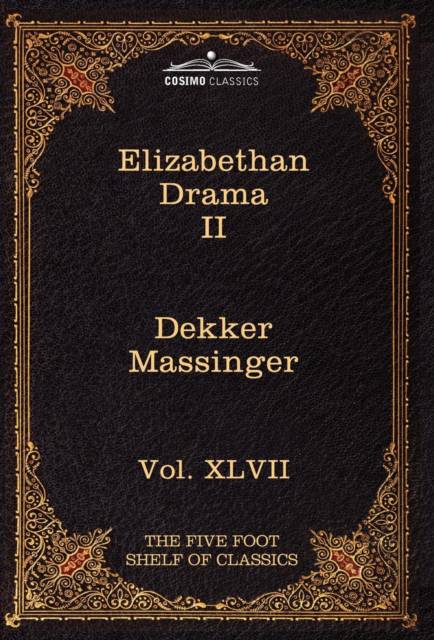
- Afhalen na 1 uur in een winkel met voorraad
- Gratis thuislevering in België vanaf € 30
- Ruim aanbod met 7 miljoen producten
- Afhalen na 1 uur in een winkel met voorraad
- Gratis thuislevering in België vanaf € 30
- Ruim aanbod met 7 miljoen producten
Zoeken
Elizabethan Drama II
The Five Foot Shelf of Classics, Vol. XLVII (in 51 Volumes)
Thomas Dekker, Philip Massinger
Hardcover | Engels
€ 54,45
+ 108 punten
Uitvoering
Omschrijving
Originally published between 1909 and 1917 under the name "Harvard Classics," this stupendous 51-volume set-a collection of the greatest writings from literature, philosophy, history, and mythology-was assembled by American academic CHARLES WILLIAM ELIOT (1834-1926), Harvard University's longest-serving president. Also known as "Dr. Eliot's Five Foot Shelf," it represented Eliot's belief that a basic liberal education could be gleaned by reading from an anthology of works that could fit on five feet of bookshelf. Volume XLVII features a selection of Elizabethan drama spanning the breadth of that newly mature domain: - The Shoemaker's Holiday, a 1599 comedy of manners and romance by THOMAS DEKKER (1572-1632) - The Alchemist, the 1610 play considered the best comedy by BEN JONSON (1572-1637) - Philaster, by FRANCIS BEAUMONT (1584-1616) and JOHN FLETCHER (1579-1625), a tragicomedy dating from around 1610 - The Duchess of Malfi, by JOHN WEBSTER (c. 1580-c. 1634), a violent, tragic horror tale - A New Way to Pay Old Debts, the 1625 satire by PHILIP MASSINGER (1583-1640), which invented a villain-Sir Giles Overreach-who endured to become a 19th-century icon
Specificaties
Betrokkenen
- Auteur(s):
- Uitgeverij:
Inhoud
- Aantal bladzijden:
- 464
- Taal:
- Engels
Eigenschappen
- Productcode (EAN):
- 9781616401702
- Verschijningsdatum:
- 1/05/2010
- Uitvoering:
- Hardcover
- Formaat:
- Genaaid
- Afmetingen:
- 140 mm x 216 mm
- Gewicht:
- 721 g

Alleen bij Standaard Boekhandel
+ 108 punten op je klantenkaart van Standaard Boekhandel
Beoordelingen
We publiceren alleen reviews die voldoen aan de voorwaarden voor reviews. Bekijk onze voorwaarden voor reviews.








